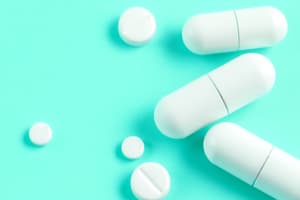Podcast
Questions and Answers
What is Pharmaceutics?
What is Pharmaceutics?
Pharmaceutics is concerned with the scientific and technological aspects of the design and manufacture of dosage forms.
What is a drug defined as?
What is a drug defined as?
A drug is defined as an agent intended for use in the diagnosis, treatment, cure, or prevention of disease in humans or animals.
What are Dosage Forms?
What are Dosage Forms?
Dosage forms are the means by which drug molecules are delivered to sites of action within the body.
Which of the following are classifications of dosage forms?
Which of the following are classifications of dosage forms?
Give an example of a liquid dosage form.
Give an example of a liquid dosage form.
An agent that neutralizes hyper-acid conditions of the stomach is called an _____?
An agent that neutralizes hyper-acid conditions of the stomach is called an _____?
Which of the following statements is true about sustained-release dosage forms?
Which of the following statements is true about sustained-release dosage forms?
Tablets are generally more expensive than capsules.
Tablets are generally more expensive than capsules.
What is the purpose of additives in dosage forms?
What is the purpose of additives in dosage forms?
Flashcards are hidden until you start studying
Study Notes
Objectives of Pharmaceutics
- Define key terms: Pharmaceutics, Drug, Dose, Dosage Forms, and their significance.
- Explain the classification of dosage forms and relevant definitions (e.g., carminative, preservative, astringent).
- Discuss how to select suitable dosage forms for patients.
Introduction to Pharmaceutics
- Focused on scientific and technological aspects of designing and manufacturing dosage forms.
- Encompasses physical chemistry necessary for dosage form design.
- Involves understanding drug absorption and action in body systems (biopharmaceutics).
- Covers design and formulation of medicines and the production processes (compounding and pharmaceutical technology).
- Addresses microbiological considerations to prevent contamination of medicines.
Definition of Key Terms
- Drug: An agent used for diagnosis, treatment, cure, or prevention of disease. Sources include:
- Natural: Plants, animals, minerals, microorganisms.
- Semi-synthetic: Antibiotics, morphine derivatives.
- Synthetic: Aspirin, paracetamol.
- Dosage: The schedule for drug administration.
- Dosage Forms: Combinations of drug and non-drug components, designed for specific administration routes and stability.
Importance of Dosage Forms
- Different dosage forms exist: oral solutions, suspensions, capsules, tablets, ointments, etc.
- Appropriate dosage forms are critical for drug stability and efficacy.
- Liquid forms like syrups are preferred for some medications, especially for pediatric use.
Classification of Dosage Forms
- Solid Dosage Forms: Include tablets, capsules, powders; often available in unit doses.
- Liquid Dosage Forms: Intended for various applications, subdivided into monophasic and biphasic forms.
- Semisolid Dosage Forms: Include ointments, creams, and pastes, primarily for external use.
Types of Dosage Forms
- Solid Dosage Forms:
- Commonly unit doses.
- Available as bulk powders for internal/external use.
- Liquid Dosage Forms:
- Monophasic: Includes syrups, elixirs, linctuses, and oral drops.
- Biphasic: Comprises emulsions and suspensions.
- Semisolid Dosage Forms:
- Ointments: For application on skin/mucous membranes.
- Creams: Viscous emulsions for external use.
- Pastes & Jellies: Thicker preparations for skin use.
Important Terminology in Pharmaceutics
- Antacid: Neutralizes stomach acidity.
- Counterirritant: Non-analgesic treatments for pain relief.
- Emollient: Softens and soothes skin.
- Expectorant: Aids in mucus expulsion from respiratory tract.
- Preservative: Inhibits microbial growth in products.
Selection of Suitable Dosage Forms
- Selection based on utility, availability, pharmacokinetics, bioavailability, stability, and local preferences.
- Tablets generally cost less than capsules; other factors also influence choice.
- For drugs with short half-lives, frequent dosing may be required; sustained-release forms improve compliance and maintain drug levels more effectively.
Studying That Suits You
Use AI to generate personalized quizzes and flashcards to suit your learning preferences.




